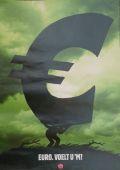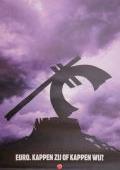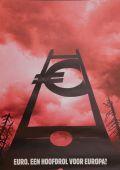Why the realists are right and the federalists are wrong
Why the realists are right and the federalists are wrong
Precisely ten years ago, on 1st January 2002, the euro became the only legal currency in the countries which had adopted it. We take a look back at the run-up to the single currency’s introduction, and look also at the links between the mistakes which were made at the time and the crisis in which Europe now finds itself.
The decision to establish a single internal market, a monetary union and a single currency forms part of the Maastricht Treaty which was signed in 1992. This treaty was followed in 1997 by the Treaty of Amsterdam.
 By 1997 the SP was already taking a leading role in the protest movement against the introduction of the euro. The party proposed that such a radical decision should be put to the people. Tiny Kox, now leader of the SP group in the Senate, was coordinator of the campaign Euro-Nee (‘No to the Euro’): “On the one hand,” he says now, “we considered that the direction of the European Union since the Maastricht Treaty was neither democratic nor social. Other political parties closed their eyes to this or thought that it would get gradually better. But it didn’t. With a single currency Brussels would acquire ever more power and would move ever further in the direction of liberalisation and privatisation of the economy. A single currency for economies which differed so fundamentally from each other would be paid for principally by the weaker countries, which would be obliged to open their markets to the stronger member states.”
By 1997 the SP was already taking a leading role in the protest movement against the introduction of the euro. The party proposed that such a radical decision should be put to the people. Tiny Kox, now leader of the SP group in the Senate, was coordinator of the campaign Euro-Nee (‘No to the Euro’): “On the one hand,” he says now, “we considered that the direction of the European Union since the Maastricht Treaty was neither democratic nor social. Other political parties closed their eyes to this or thought that it would get gradually better. But it didn’t. With a single currency Brussels would acquire ever more power and would move ever further in the direction of liberalisation and privatisation of the economy. A single currency for economies which differed so fundamentally from each other would be paid for principally by the weaker countries, which would be obliged to open their markets to the stronger member states.”



SP posters from the campaign against the Euro
Resistance
Large numbers of people joined the resistance. More than 50,000 signatures were collected. Criticism did not come, moreover, only from the SP and its supporters. Many economists also warned of the huge risks which would result from forced monetary integration. One of these was Alfred Kleinknecht, who in the SP monthly Tribune noted that “the biggest threat from the monetary union will in my view be to the weaker economies on the south coast of Europe. Without the possibility to devalue or the right to invest more, all that will be left to look forward to will be mass unemployment and the further cutting back of the welfare state.” This is precisely what in 2012 we see happening in southern Europe.
Professor Arjo Klamer also signed the manifesto against the European Monetary Union, and asked angrily whether “
you know that our future is being determined across the board? That The Hague is going to be tied hand and foot so that it will have to take a knife to the social security system, whether we, the Dutch people, like it or not?”
 Jan Marijnissen, at the time leader of the SP, subjected the ambitions behind the euro to thorough scrutiny. “With the loss of our guilder we are losing more than folklore. We are losing our say in the area of monetary policy, and everything which depends on that. With the Euro in place, the Guilder would be gone and our control of monetary policy would disappear in the direction of the European Central Bank in Frankfurt. The Europe of 1997 is not a country; it is not a nation with which people can identify, a place where they feel themselves to be understood. They have nothing really to do with it, whether or not political leaders decide that we will have a monetary union from 1999 and a single currency from 2002. Europe is only a geographical concept, an abstraction in fact. There is no European people, no European language, no European culture.”
Jan Marijnissen, at the time leader of the SP, subjected the ambitions behind the euro to thorough scrutiny. “With the loss of our guilder we are losing more than folklore. We are losing our say in the area of monetary policy, and everything which depends on that. With the Euro in place, the Guilder would be gone and our control of monetary policy would disappear in the direction of the European Central Bank in Frankfurt. The Europe of 1997 is not a country; it is not a nation with which people can identify, a place where they feel themselves to be understood. They have nothing really to do with it, whether or not political leaders decide that we will have a monetary union from 1999 and a single currency from 2002. Europe is only a geographical concept, an abstraction in fact. There is no European people, no European language, no European culture.”
 In the framework of the 'Euro-Nee' campaign the SP organised a conference to run parallel to the 1997 Amsterdam European Council Summit. The conference (called the ‘Eurostop’, a pun on the Dutch for European Summit, ‘Eurotop’) – attracted progressive forces from a range of countries and political tendencies to one of the city’s main meeting places, the Beurs van Berlage, a former commodity exchange. What united these different currents was anxiety over the growing power of a European Union guided by neoliberal policies. The conference ended in a call from all sides to “Let Europe’s peoples decide Europe’s future.”
In the framework of the 'Euro-Nee' campaign the SP organised a conference to run parallel to the 1997 Amsterdam European Council Summit. The conference (called the ‘Eurostop’, a pun on the Dutch for European Summit, ‘Eurotop’) – attracted progressive forces from a range of countries and political tendencies to one of the city’s main meeting places, the Beurs van Berlage, a former commodity exchange. What united these different currents was anxiety over the growing power of a European Union guided by neoliberal policies. The conference ended in a call from all sides to “Let Europe’s peoples decide Europe’s future.”
As we now know, the opportunity to do this was never granted. On 1st January 2002 the common currency became a fact throughout the Eurozone. Only a few years later, in 2005, the Dutch people were for the very first time asked for their opinion on further European unification. The result of the referendum on the European Constitution confirmed what for years the SP had argued, that the great majority of the Dutch population did not believe that more powers should be transferred to Brussels.
It’s now 2012 and Europe is in crisis, a crisis which has held the world in its grip for the last three years. It is now generally recognised that there is a flaw in the euro, that the unified currency should have been introduced only when greater economic and political integration had been achieved. Moreover, these are not matters about which the majority of Europeans need much persuading. The price of this flaw is being paid by the ‘ordinary’ man, woman and child.
2012 will be a crucial year for Europe. We stand once again at a crossroads. Do we transfer more powers to ' Brussels ' or do we stand for cooperation and solidarity amongst Europe’s peoples?
